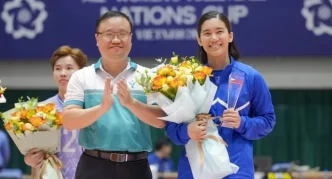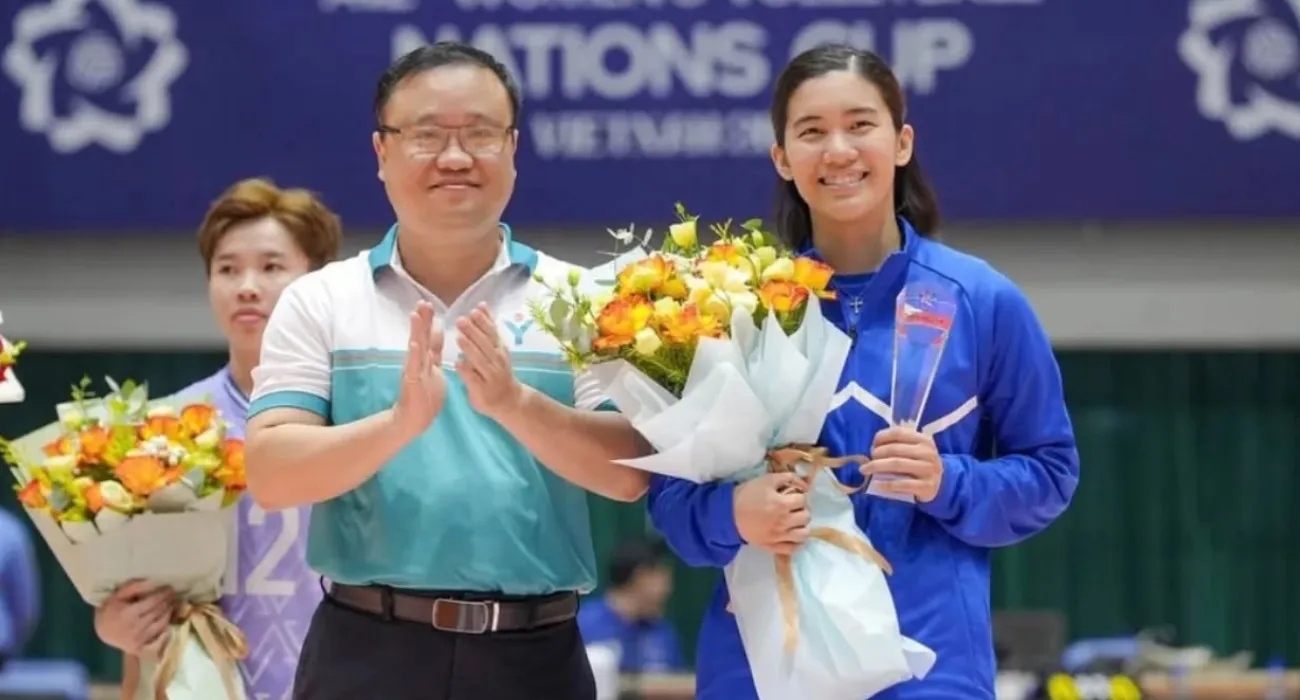The Philippine women’s volleyball team has emerged as a formidable force in regional sports, clinching a silver medal at the AVC Women’s Nations Cup in Hanoi, Vietnam. Despite falling to the host nation in a decisive final match, the team’s performance has sparked optimism about their potential to dominate Southeast Asian volleyball, with the SEA Games in Thailand later this year looming as the next major test.
A Milestone Achievement
The Filipinos’ journey to the silver medal was marked by resilience and grit. After a grueling five-set semifinal victory against Chinese Taipei, the team faced Vietnam in the final at Dong Anh Arena. The host nation delivered a commanding 25-15, 25-17, 25-14 win on Saturday night, but the Philippine squad’s second-place finish was widely celebrated as a significant step forward. For a team that secured bronze in the previous edition of the tournament, this result signals a steady ascent in the regional hierarchy.
Vietnam’s head coach, Nguyen Tuan Kiet, acknowledged the Filipinos’ prowess, stating through an interpreter, “The Philippine team delivered a remarkable performance. The Philippines will undoubtedly be a serious contender [later] this year [in the Southeast Asian Games].” His words underscore the growing recognition of the team as a legitimate power in the sport, a sentiment echoed across the region.
Team Spirit and Individual Brilliance
At the heart of the team’s success is captain Jia De Guzman, whose leadership and skill earned her recognition as the best in her position for the second consecutive edition of the tournament. Reflecting on the silver medal, De Guzman expressed pride in the team’s progress. “It means everything, honestly, because it’s hard to see the growth of the sport and our team without the result” she said. “We didn’t expect to get a silver coming into this tournament. We just knew that we had to give our best because last year we got the bronze.”
De Guzman, a 30-year-old playmaker, sees the achievement as a motivator for the future. “This silver inspires us to go back to training and keep working together as a team and to keep going for this long-term program because, slowly but surely, we’re rising as a country” she added. Her comments highlight a collective determination to build on this success and aim for the top spot in upcoming competitions.
Brazilian coach Jorge Souza de Brito, who also guided the team to bronze last year, shared in the celebration of their progress. “We are happy with second place. We’re on the way [to bigger things]” he said. “It’s a process. I’m happy and proud of all the players and coaching staff, all the support also that you have from the federation.” De Brito emphasized the potential for growth, noting, “Really, really good players that you have to develop them here and the group will become stronger and stronger year after year. I’m sure of it.”
Challenges and Opportunities Ahead
While the silver medal marks a historic moment, the final match against Vietnam exposed areas for improvement. Fatigue from the semifinal marathon against Chinese Taipei likely played a role in the team’s performance in the gold medal game. With months to prepare for the SEA Games in Thailand later this year, Coach De Brito and his squad have time to address these lapses and refine their strategy.
One challenge noted by observers is the team’s physical stature. Vietnam’s coach highlighted that key Philippine players like Angel Canino and Bella Belen “stood out despite their modest height.” While height can be an advantage in volleyball, team cohesion and tactical execution often prove just as critical. The coming months will test De Brito’s ability to further unify the squad and maximize their collective strengths.
The talent within the team is undeniable. No Philippine women’s volleyball squad in recent memory has appeared as formidable as this one. Their performance in Hanoi has not only boosted national pride but also forced neighboring countries to take notice. As De Brito works to mesh the team’s dynamics, the SEA Games will serve as a proving ground for whether this group can overcome physical limitations through skill and synergy.
A Rising Force in Southeast Asian Sports
The silver medal at the AVC Nations Cup is more than a trophy; it represents a turning point for women’s volleyball in the Philippines. The sport has long struggled for recognition and resources in a country where basketball dominates. Yet, with each victory, the team is carving out a space for volleyball in the national consciousness. Their success could inspire a new generation of athletes and bolster support from federations and fans alike.
For now, the focus remains on the SEA Games, where the Philippines will face stiff competition from regional powerhouses like Thailand and Indonesia. A strong showing there could cement their status as a leading force in Southeast Asian volleyball. The journey from bronze to silver has already demonstrated their potential; the next step—gold—feels within reach if the team continues on this trajectory.
As the Philippine women’s volleyball team returns to training, their silver medal shines as a beacon of hope and a reminder of what hard work and dedication can achieve. For fans across the archipelago, the anticipation builds for the SEA Games, where this intrepid crew hopes to turn silver into gold and claim their place at the pinnacle of regional sport.















